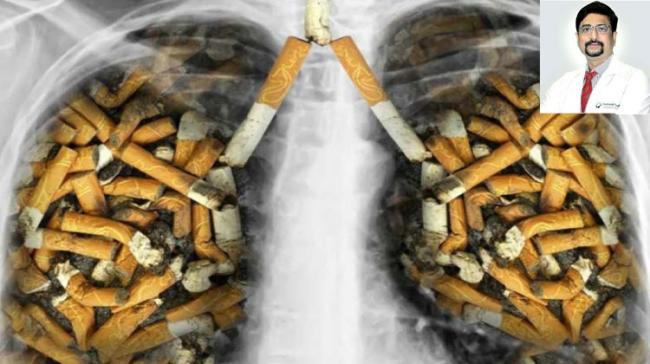Smoking: The No.1 Cause Of Preventable Disease And Death

By Dr A SAI RAVI SHANKER
World Health Statistics has reported that Cigarette smoking accounts for about one-fifth of all deaths from heart disease in the India. Smokers have a two- to fourfold increase in coronary artery disease and about a 70 percent higher death rate from coronary artery disease than non-smokers.
Smoking is a major risk factor for heart disease.The prevalence of smoking or use of any tobacco product in 22.8% in men and 2.4% in women.
Smoking causes:
• Decreased oxygen to the heart and to other tissues in the body
• Decreased exercise tolerance
• Decreased HDL (good) cholesterol
• Increased blood pressure and heart rate
• Damage to cells that line coronary arteries and other blood vessels
• Increased risk of developing coronary artery disease and heart attack
• Increased risk of developing peripheral artery disease and stroke
• Increased risk of developing lung cancer, throat cancer, chronic asthma, chronic bronchitis and emphysema
• Increased risk of developing diabetes
• Increased risk of developing a variety of other conditions including gum disease and ulcers
• Increase tendency for blood clotting
• Increased risk of recurrent coronary artery disease after bypass surgery
• Increased risk of becoming sick (especially among children: respiratory infections are more common among children exposed to second-hand smoke)
There was always only one rule. It's that one puff of nicotine will cause up to half of your brain's dopamine pathway receptors to become occupied by nicotine.
During recovery, the brain needs up to 72 hours to rid itself of all nicotine, to re-sensitize once nicotine saturated receptors, and to move beyond peak withdrawal. It also needs 2-3 weeks to down-regulate and eliminate the millions of extra nicotinic receptors that nicotine caused it to grow.
No Smoking Day aims to bring awareness to the dangers of this addiction. The day also tries to spotlight resources available to help people decide to try and quit
No Smoking Day started out in 1984 and has grown in size and scope since then. It is celebrated in communities across the world trying to educate more people every year.
The benefits of quitting smoking
Now that you know how smoking can be harmful to your health and the health of those around you, here’s how quitting smoking can be helpful. If you quit smoking, you will:
• Prolong your life. According to the American Heart Association, smokers who quit between ages 35-39 add an average of 6-9 years to their lives. Smokers who quit between ages 65-69 increase their life expectancy by 1 – 4 years.
• Reduce your risk of cardiovascular disease. Quitting smoking reduces the risk of repeat heart attacks and death from heart disease by 50 percent or more. Quitting smoking also reduces your risk of high blood pressure, peripheral artery disease and stroke.
• Reduce your risk of developing a variety of other conditions including diabetes, lung cancer, throat cancer, emphysema, chronic bronchitis, chronic asthma, ulcers, gum disease and many other conditions.
• Feel healthier. After quitting, you won't cough as much, have as many sore throats and you will increase your energy.
• Look and feel better. Quitting can help you prevent face wrinkles, get rid of stained teeth, improve your skin and even get rid of the stale smell in your clothes and hair.
• Improve your sense of taste and smell.
• Save money.
How can I quit?
There's no one way to quit that works for everyone. To quit smoking, you must be ready emotionally and mentally. You must also want to quit smoking for yourself, and not to please your friends or family.
Also Read: Cutting Down On Alcohol May Help Quit Smoking: Study




